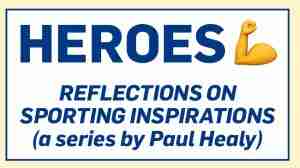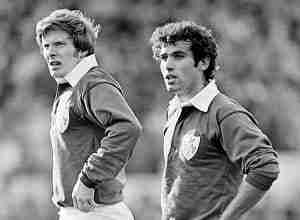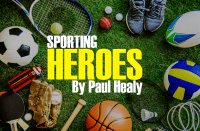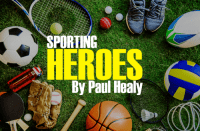
 Looking back, is it any wonder that rugby wasn’t our first, or second, or third, sporting love? It just wasn’t there much…
Looking back, is it any wonder that rugby wasn’t our first, or second, or third, sporting love? It just wasn’t there much…
45 years ago, rugby, in as much as it registered with us at all, was played by a small minority, primarily (it seemed) in urban areas, mostly (but not entirely) by the so-called professional classes. Maybe my memory is playing tricks on me, but it seemed almost like a closed world, certainly completely lacking the community-wide inclusiveness of the GAA.
Don’t blame us – the kids of 1970s’ rural Ireland – if we didn’t live and breathe for the oval ball. Rugby just wasn’t there! At least not particularly visibly!
So it could never be our first love – you’re not likely to fall in love if you’re not sharing the same world.
And back then, rugby seemed to belong to a different world to ours.
In Rooskey, we knew there was a rugby club in Longford, but we knew hardly anything about it. We were only aware of it from the weekly half-page summary in the Longford Leader, above the squash and tennis round-ups. We really only properly took interest when the rugby club in Longford started running discos at the weekend. My friends and I went to a few of those discos – smooching up to the bar counter when there was the first terrifying sign of downward movement on the shutters – but I don’t suppose that qualifies as taking an interest in rugby.
Growing up in Rooskey in the early 1970s, we simply weren’t exposed to this sport (later, I would discover that there were small but proud rugby strongholds around the region).
But things change. Ever so gradually, through the endeavours of the handful of local clubs, and a gradually growing media profile, rugby began to feature more in our lives. We noticed this change in Rooskey when a few of our GAA/soccer lads joined Longford Rugby Club! Now, all of a sudden, we had to share some of our best players. There were reports of towering performances by the Dynamo Rooskey/Kilglass Gaels’ lads in the Longford rugby colours, mutterings too about fixtures clashing. “They have what on Sunday morning? A rugby game?!” Reason tended to prevail. Now, different worlds were merging. Now, rugby was here. Our local lads were playing the game. Rugby was actually becoming an option for young men. Perhaps without us realising it, the scope of our sporting imagination was broadening.
Before we knew it, rugby was becoming a credible contender for our affections. It had a lot of catching up to do, mind you. We were in love with the GAA and soccer – and maybe one or two others – we weren’t going to be easily won over by this new rival for our interest. But, make no mistake about it, rugby was muscling in and looking for the next dance.
And whatever about the earnest efforts of the club volunteers in Longford and Carrick-on-Shannon, the really serious flirting was being done by Fred and Bill…
His name was Tony
Rugby struck once a year, with devastating intent, over a five-week period or so. The Five Nations Championship (now the Six Nations) simply bulldozed into our consciousness, then fluttered its eyelids at us, one glorious Saturday after another. A holiday romance, to the soundtrack of Fred and Bill. Then it was gone, leaving us exhausted but happy, before we invariably returned – bashfully – to soccer and GAA.
Fred and Bill? For us, they were the voices of rugby…creating a special atmosphere, wooing us into this world. In truth, I include Fred mostly on patriotic grounds; well, he was our voice, here in Ireland. He was the RTE commentator, and a good one, even if his style was a bit too laidback. But Bill was something else. Bill McClaren, a Scottish commentator with the BBC, had a voice from the Heavens, and was the intoxicating sound of the Five Nations, the man who electrified the otherwise dank Saturdays of spring. You almost wanted it to be raining and miserable outside, as thirty mostly beefy, stern-faced men plodded on to a mucky pitch…and then the unique voice of the wonderful Bill McClaren took over, warming our spirits, entrancing us with his vocabulary and passion. With Bill in charge for the afternoon, guiding us through the contours of the game – its rolling drama – in his hypnotic tones, all was well with our world. Looking back, he was a hero of our youth.
And what of the Irish team? Now that we had discovered rugby, as relayed to us by these iconic commentators, it was high time we connected with the men in green. Were they any match for the dazzling Welsh, who seemed to be the Brazil of rugby? I soon discovered that while we’d produced our share of artists – most notably the genius that was Mike Gibson – much of our rugby heritage was built on brawn, fighting spirit, a heroic ‘up and at them’ mentality. (Gibson played his last game for Ireland in 1979, at the age of 36, ending a wonderful career, almost all of which I had missed!). No team fancied coming to Dublin, the commentators assured us. Come to Dublin and have 15 green warriors throw the kitchen sink at you, was the slightly patronising narrative. But could we even dream of replicating the flair so often exhibited by the Welsh, and the French too? Was there even the hint of a successor to Gibson? Were we forever destined to be lion-hearted Ireland when we won, and brave, plucky Ireland when we lost, with little enough subtlety in between? Was there anything else?
His name was Tony.
What could go wrong?
I can’t be sure where Tony Ward sits in the Irish rugby Hall of Fame, where he ranks in the ‘Greatest Players’ list. I am under no illusions – as gifted as he was, he might struggle to feature prominently. The main reason for that is because most of our greatest ever players have come along during the professional era (another reason is because Ward only earned 19 caps). We have had unprecedented success in recent decades, with Grand Slam wins, triple crowns, several Six Nations’ titles, victory over the All Blacks, World No. 1 ranking(!)…and all of it against a backdrop of wonderful success in Europe at provincial level. This prolonged glory era has yielded (and been made possible by) our greatest ever players, a succession of magnificent sportsmen, including Brian O’Driscoll, Keith Wood, Paul O’Connell, Ronan O’Gara, Johnny Sexton and others.
But heroes don’t have to be the very best, or the most decorated…all they ‘have’ to do is claim a place in your heart, and live there for all time!
To my very young eyes, as I savoured this annual rugby fest on TV in the late 1970s, it seemed that just as Mike Gibson was retiring, the Gods had delivered a new genius: Tony Ward. The dashing out-half simply took our breath away. Good-looking, charismatic, unpredictable, audacious…we couldn’t take our eyes off him. Now we had our own Phil Bennett, now we had some of that Welsh or Gallic flair, all wrapped in a green jersey, home-grown. Ward made his Ireland debut in 1978. Now we had guile, intricacy, sidesteps, dummies, audacity! A performance against Wales in Cardiff will always live on in my memory, Ward setting up two tries with jinking runs. Do not adjust your set! Take note, Fred and Bill! Ward quickly attained superstar status. He was voted European Player of the Year for 1978/’79. Ward also starred in Munster’s legendary win over the All Blacks in 1978. Soon, he was being referred to as rugby’s George Best. (Ward actually played League of Ireland soccer for a couple of seasons!). The future was bright. Happy days. What could possibly go wrong?
Introducing…Ollie
What happened next rocked the Irish sporting world, arguably achieving Saipan-sized notoriety. In 1979, with Ireland touring Australia, the Irish selectors sensationally dropped Ward. There is a suggestion that the powers that be weren’t keen on Ward’s celebrity status. Introducing…Ollie. Ollie was, and is, Ollie Campbell. After winning his first Irish cap in 1976, he’d been out of favour for three years. The decision to drop Ward in favour of Campbell stunned the rugby world, and was hugely controversial. There may have been rugby politics imvolved. Maybe the selectors simply saw Ward, for all his great talent, as too much of a maverick. Campbell delivered magnificently, and held the jersey. In 1982, he scored all 21 points as Ireland defeated Scotland at Lansdowne Road, to win the Triple crown. I was there. I hope Tony understands.
The Campbell/Ward dilemma was seismic, with fans and the media divided. An attempt to accommodate both men in the same team was short-lived.
Truth is, the decision to choose and continue with Campbell turned out to be absolutely justified. He became an Irish rugby great, a legend of the game. Tony Ward never fully recovered from the saga.
Heroes…and friends
Around 1986, having just recently retired from international rugby, the great Ollie Campbell arrived into our family pub in Rooskey. He’d been to a meeting in Hanley’s factory. I was star-struck, but recovered my composure well enough to beat Ollie Campbell in two games of pool (maybe I did it for Tony).
Ollie was a gentleman. I’ve never met Tony, not yet. Knowing him, he’s probably brilliant at pool too.
Tony and Ollie. We just happened to uncover two superstars who, for all their brilliance, would not fit into the same jersey. In that sense, we were a little bit cursed; but of course we were far more blessed. I idolised Ward. But they are both heroes. And they actually became great friends!
Rugby is now a great presence in our lives for several months each year, a far cry from our limited exposure to it in those pre-professional days. International, provincial and club and schools’ success has thrilled us. Locally, we celebrate the great success story that is Creggs RFC.
Nowadays, even though I can’t say I fully understand the intricacies of the game, I have a big place in my heart for rugby. From Bill McClaren to BOD, to my mate Ollie Campbell…to my hero Tony Ward, the man whose dancing feet all too briefly took our breath away.





